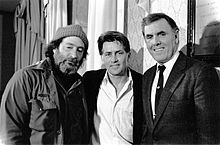Mitch Snyder
| Mitch Snyder | |
|---|---|
 |
|
| Born | Mitch Snyder |
| Nationality | American |
| Occupation | Activist for the homeless |
Mitch Snyder (August 14, 1943 – July 3, 1990) was an American advocate for the homeless. He was the subject of a made-for-television 1986 biopic, Samaritan: The Mitch Snyder Story, starring Martin Sheen.
Snyder grew up in Flatbush, Brooklyn, New York, where at age 9 his father abandoned the family. After a stint in a correctional facility for breaking into parking meters, Snyder worked in job counseling on Madison Avenue in New York City, as well as selling appliances and construction work. In 1969 he left his wife and children and started hitchhiking west. Police found him in a stolen vehicle, and he was arrested and convicted of grand theft auto. He served two years in federal prison, 1970–1972, for violating the Dyer Act, which outlaws the interstate transportation of a stolen vehicle. Snyder ended up in Danbury Federal Correctional Institution in Danbury, Connecticut, where he served time with Philip and Daniel Berrigan. Following meetings with them and prolific reading, especially of the Bible, Snyder started participating in hunger strikes and work stoppages over prisoners' rights issues.
Upon being released in 1973 Snyder came home to rejoin his family. Less than one year later he left his family again and joined the Community for Creative Non Violence (CCNV) in Washington, D.C. CCNV was at that time operating a medical clinic, a pretrial house, a soup kitchen, a thrift store and a halfway house. CCNV came out of a discussion group about the Vietnam War at George Washington University. CCNV was also very active in nonviolent direct action in opposition to the Vietnam War. Snyder became the driving force of CCNV but worked with many deeply committed people including his wife and professional partner, Carol Fennelly; Mary Ellen Hombs, with whom he co authored Homelessness in America: A Forced March to Nowhere; and Ed and Kathleen Guinan.
...
Wikipedia
